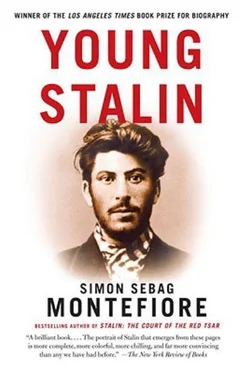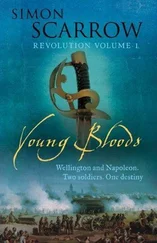The singing teacher was not the only master who helped Stalin. Davitashvili’s older cousin Zakhary was another inspiring teacher of Russian literature, and years later Keke wrote, “I remember how you distinguished my son Soso and he told me many times that it was you who helped him grow fond of studying and it was thanks to you, he learned Russian so well.”
Even as a septuagenarian dictator and conqueror of Berlin, he kept studying. “Look at me,” he said in about 1950, “I’m old and I’m still studying.” His library books are all carefully marked with his notes and marginalia. It was the thoughtful and diligent autodidactic fervour, well concealed under the crude manners of a brutal peasant, that his opponents such as Trotsky ignored at their peril.
This was ironic given the number of beautiful and ancient churches that Stalin would later demolish and the number of priests he would execute.
Stalin never forgot his singing teacher. When he wrote to Keke from exile or the underground, he would often send his regards to Simon Gogchilidze. Keke would show Gogchilidze the message but keep her hand over the rest of the letter: “You can read the passage about you ,” she said, “but there’s no need for you to read the rest and know where my son is now.”
The seminarists were mainly gentry, poorer nobility and priests’ sons, not the very richest—but much better off than Stalin. The Gori police chief’s son Davrichewy and other better-off boys like Stalin’s future comrade Kamenev attended the Tiflis Boys’ Gymnasium. The affluent Egnatashvili boys, Vaso and Sasha, were sent to a gymnasium in Moscow. During the Stalin years, the seminary bore the plaque: THE GREAT STALIN—LEADER OF THE VKP(B) AND PROLETARIAT OF THE WORLD—LIVED AND STUDIED IN THE EX-THEOLOGICAL SEMINARY FROM 1 SEPTEMBER 1894 TO 29 MAY 1899 LEADING ILLEGAL WORKERS’ CIRCLES IN TBILISI.
“To Archimandrite Serafim, Very Reverend Rector of the Tiflis Orthodox Seminary from 2nd Grade student Josef Djugashvili: Your Reverence knows all about the pitiful circumstances of my mother who takes care of me. My father has not provided for me in three years. This is his way of punishing me for continuing my studies against his wishes… It is for this reason I am applying to Your Reverence for the second time. I beg you on my knees to help me and accept me on full public expense. Josef Djugashvili 25 August 1895.”
Stalin was immersed in Georgian poetry: he loved Eristavi; Chavchavadze was “a great writer with a huge role in the freedom movement of Georgia;” and he enthused about Akaki Tsereteli: “My generation learned the poems of Tsereteli by heart and with joy… beautiful, emotional and musical, he’s rightly called the nightingale of Georgia.” But, looking back, Stalin also measured these poets politically, saying Tsereteli wrote “beautiful poems but ideologically primitive and parochial.” Stalin was not the only poetical future Bolshevik: at exactly the same time, at his school in Odessa, young Leon Bronstein, the future Trotsky and near contemporary, was also writing poems. Trotsky far outstripped Stalin as a writer but not as a poet. If any of Stalin’s colleagues had dedicated a poem to a prince, it would have been used against them in the Terror. In 1949, for Stalin’s official seventieth birthday, the Politburo magnate Beria secretly commissioned the best poetical translators, including Boris Pasternak and Arseni Tarkovsky, to create a Russian edition of the poems. They were not told the author of the poems but one of the poets thought “this work is worthy of the Stalin Prize first rank,” though perhaps they had guessed the identity of the young versifier. In the midst of the project, they received the stern order, clearly from Stalin himself, to stop the work.
“A hasty visit, especially if ladies are of the party,” suggests Baedeker, “is best made by carriage… Public safety is on a somewhat unstable footing; it is well to avoid travelling alone or the exhibition of much money (for permission to carry a revolver see earlier). It is advisable to keep a sharp lookout on one’s belongings as natives are not averse from picking up unconsidered trifles.” Baedeker adds that even a letter of introduction from the viceroy or to local princes are of limited use in “surmounting difficulties that arise: these can be successfully met only by a resolute bearing”—and probably with the help of the revolver mentioned earlier.
Hugo’s hero Cimourdain had “never been seen to weep… [he had an] inaccessible and frigid virtue. A just but awful man. There are no half-measures for a revolutionary-priest [who] must be infamous and sublime. Cimourdain was sublime… rugged, inhospitably repellent… pure but gloomy.”
These young Marxists would copy out Marx by hand and distribute the manuscripts. When his Gori friend Kote Khakhanashvili came home with some Marx volumes, Stalin borrowed them but then refused to return them: “Why do you need them? They’re being passed through many hands and people are learning from them.” He also purloined a German-language textbook. Yet his English and German studies never led to fluency: even in the early 1930s he was asking his wife, Nadya, to send him an English textbook to study on holiday.
Most historians repeat the assertion that Stalin never saw Beso much after 1890, but a reading of several sources in the archive, as well as Candide Charkviani’s memoirs, show he saw his alcoholic father much later.
In September 1931, his old history teacher, lingering in the dungeons of the Metekhi Fortress-Prison of Tiflis, managed to get an appeal to his old pupil, now the Soviet dictator. Stalin wrote thus to Beria, his Caucasian viceroy: “Nikolai Dmitrievich Makhatadze aged 73 finds himself in Metekhi Prison… I have known him since the Seminary and I do not think he can present a danger to Soviet power. I ask you to free the old man and let me know the result.”
George Gurdjieff, the spiritualist author of Meetings with Remarkable Men , charlatan to some, hierophant magus to others, claimed to have attended the seminary with Stalin, who, he said, stayed with his family in Tiflis. But Gurdjieff, of Armenian origins, was a fantasist: born in 1866, he was twelve years older than Stalin and there is no evidence he attended the seminary at all. Stalin boarded at the seminary during the term. Gurdjieff also claims a “Prince Nijeradze” as a companion: “Nizheradze” was an alias later used by Stalin in Baku. But there is no evidence that any of Gurdjieff’s claims are true. During his reign, Stalin persecuted spiritualists and specifically “Gurdjieffites,” who were often shot.
On 4 September 1943, the exiled Russian Patriarch Sergei and two Metropolitans were summoned for a bizarre nocturnal Kremlin chat at which Stalin revealed that he had decided to restore the Patriarchate, churches and seminaries. Sergei thought perhaps it was too early for seminaries. Stalin replied, “Seminaries are better,” but mused disingenuously, “Why don’t you have any cadres? Where have they disappeared to?” Instead of replying that his “cadres” had been systematically liquidated by Stalin, Sergei tactfully joked: “One of the reasons is that we train a person for priesthood and he becomes a Marshal of the Soviet Union.” Stalin then reminisced about the seminary until 3 a.m. “Your Grace,” he concluded, wishing the priests good night, “that’s all I can do for you now.”
Читать дальше












